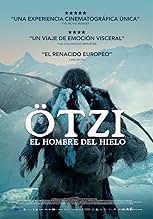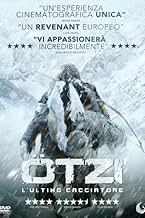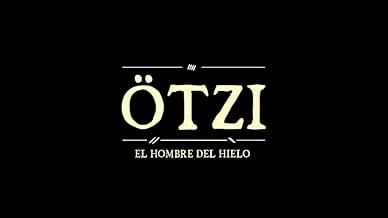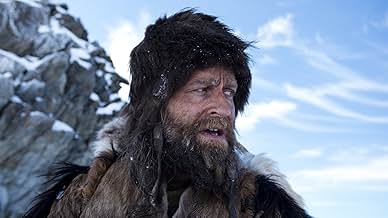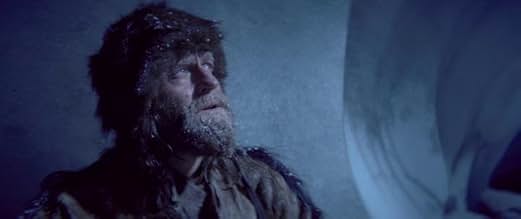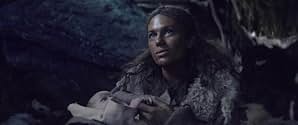NOTE IMDb
6,4/10
3,4 k
MA NOTE
Il y a 5300 ans dans les Hautes-Alpes, un clan néolithique s'est installé près d'une crique. Kaleb, chef de tribu, est le gardien de Tineka, le sanctuaire sacré du groupe. Pendant que Kelab ... Tout lireIl y a 5300 ans dans les Hautes-Alpes, un clan néolithique s'est installé près d'une crique. Kaleb, chef de tribu, est le gardien de Tineka, le sanctuaire sacré du groupe. Pendant que Kelab part à la chasse, la tribu est attaquée.Il y a 5300 ans dans les Hautes-Alpes, un clan néolithique s'est installé près d'une crique. Kaleb, chef de tribu, est le gardien de Tineka, le sanctuaire sacré du groupe. Pendant que Kelab part à la chasse, la tribu est attaquée.
- Récompenses
- 5 nominations au total
Avis à la une
This film is important. It has a great perspective and shows you how far we have really come. I great story of evil and good and their coexistence. It actually lowered my anxiety in a weird way. The sound is just fantastic in this film. As well as cinematography and direction and performance. Nothing really bad to say about, its effective and is bare bones story telling. Not pretentiously overlong. I loved it.
There are several surprises in the story and they don't make sense. In the course of his travels through the Netherlands our hero he was seeking revenge against those who killed his wife/girlfriends/I don't know the relationship because nobody speaks English, this is a movie without dialogue, which has to carry itself just on the effect of the actors upon each other and what they receive from the surrounding cascade. One scene that doesn't understand my comprehension is the same before this. He's traveling along going up a creek bed and then all of a sudden he's gotta goat and I suppose that's to feed the baby that he rescued from the destruction of his village. Now the goat has short-lived necessity as he slaughters it and cooks it and then all of a sudden he has friends that want to eat the goat with him, at this time, the baby that he's been carrying around for about 2/3 of the movie, he palms off on the new friends and he goes looking for revenge against those who killed his family and his village and birth, etc. So he's on the trail of these bad people and for some reason they go over a vast mountain range where there's no shelter no food and no purpose to be there. But his journey goes on to find those bad people and that's all I can say without giving away the ending.
A Neolithic revenge story seeks to explain the mysterious man found frozen in the Alps. Written and directed by Felix Randau, and originally release in Germany in 2017 as Der Mann aus dem Eis, Iceman purports to tell the story of a Copper Age man preserved in the frozen Alps for 5,000 years. Beautiful landscapes and harrowing authenticity help balance what might otherwise be a one-dimensional revenge plot.
Kelab (Jürgen Vogel), Kisis (Susanne Wuest), and their clan are living in the Ötztal Alps around 3000 BC, where Kelab protects a fetish called Tineka. The clan is blessed with the birth of a child, but grieved by the loss of its mother. When Kelab is off hunting in the woods, a trio of raiders attack his village, slaughter its inhabitants, and steal their idol. Filled with a desire for revenge, Kelab rescues the newborn and pursues the raiders.
Along the way, Kelab interacts with other Neolithic people, including an old man, Ditob (Franco Nero), and his daughter Mitar (Violetta Schurawlow), in their sparsely populated valley. Can Kelab survive the harsh elements to exact revenge and take back his sacred Tineka?
Iceman was inspired by Ötzi the Iceman. In 1991, Alpine hikers discovered a mummified body partially frozen in ice. Shockingly, scientists dated its age to somewhere between 3400 and 3100 BC. The adult male was so well preserved that scientists were able to determine precisely what he ate in the days before he died. Most intriguingly, they discovered his cause of death was an arrow impaled in his back, compounded by other injuries.
It's impossible to say for certain who this man was and the larger circumstances leading to his death, but evidence gathered from his corpse informs Iceman in a credible and convincing way. Scientists identified blood from at least four other people on his weapons and clothing, so we know he was involved in a violent struggle. The film is so authentic its characters even speak an early version of Rhaetic, a language related to Etruscan and spoken by pre-Indo Europeans living in that region.
Like Alpha (2018), Iceman has great cinematography, was shot in beautiful and sweeping landscapes, and tries to authentically re-create prehistoric culture. Unlike Alpha, however, Iceman has a realistic story. When one man falls from a sheer cliff, he breaks his back instead of being conveniently saved by ridiculously improbable circumstances.
But for all its good qualities, Iceman left something to be desired. The 1981 French film Quest for Fire, in which the the dialog is also spoken in a prehistoric language, benefited from rich interactions between the characters. In contrast, Iceman was oddly solipsistic. Interactions between characters were kept at a bare minimum. I expected much more, particularly when it came to Kelab and his encounters with other humans. I'm not an anthropologist, but I'm pretty sure we were able to communicate and express emotions other than anger back then.
Iceman was generally praised by critics, but left audiences shrugging their shoulders. It currently has an audience favorability rating of 54% on RottenTomatoes. I probably would've had the same reaction if I didn't love historically authentic films. For me, seeing this primitive man's world come to life more than made up for Iceman's deficiencies.
Kelab (Jürgen Vogel), Kisis (Susanne Wuest), and their clan are living in the Ötztal Alps around 3000 BC, where Kelab protects a fetish called Tineka. The clan is blessed with the birth of a child, but grieved by the loss of its mother. When Kelab is off hunting in the woods, a trio of raiders attack his village, slaughter its inhabitants, and steal their idol. Filled with a desire for revenge, Kelab rescues the newborn and pursues the raiders.
Along the way, Kelab interacts with other Neolithic people, including an old man, Ditob (Franco Nero), and his daughter Mitar (Violetta Schurawlow), in their sparsely populated valley. Can Kelab survive the harsh elements to exact revenge and take back his sacred Tineka?
Iceman was inspired by Ötzi the Iceman. In 1991, Alpine hikers discovered a mummified body partially frozen in ice. Shockingly, scientists dated its age to somewhere between 3400 and 3100 BC. The adult male was so well preserved that scientists were able to determine precisely what he ate in the days before he died. Most intriguingly, they discovered his cause of death was an arrow impaled in his back, compounded by other injuries.
It's impossible to say for certain who this man was and the larger circumstances leading to his death, but evidence gathered from his corpse informs Iceman in a credible and convincing way. Scientists identified blood from at least four other people on his weapons and clothing, so we know he was involved in a violent struggle. The film is so authentic its characters even speak an early version of Rhaetic, a language related to Etruscan and spoken by pre-Indo Europeans living in that region.
Like Alpha (2018), Iceman has great cinematography, was shot in beautiful and sweeping landscapes, and tries to authentically re-create prehistoric culture. Unlike Alpha, however, Iceman has a realistic story. When one man falls from a sheer cliff, he breaks his back instead of being conveniently saved by ridiculously improbable circumstances.
But for all its good qualities, Iceman left something to be desired. The 1981 French film Quest for Fire, in which the the dialog is also spoken in a prehistoric language, benefited from rich interactions between the characters. In contrast, Iceman was oddly solipsistic. Interactions between characters were kept at a bare minimum. I expected much more, particularly when it came to Kelab and his encounters with other humans. I'm not an anthropologist, but I'm pretty sure we were able to communicate and express emotions other than anger back then.
Iceman was generally praised by critics, but left audiences shrugging their shoulders. It currently has an audience favorability rating of 54% on RottenTomatoes. I probably would've had the same reaction if I didn't love historically authentic films. For me, seeing this primitive man's world come to life more than made up for Iceman's deficiencies.
...interesting for the reasonable version of Otzi life, for cinematography and for the status of experiment, for the tension and desire to recreate a lost world. I t is easy to critic this movie but, in my case, preserving the fascination about the discover of the Otzi mummy, the film represents a decent answer to a history who could only be imagined. So, easy to propose comparations or discover mistakes. But the essence remains interesting and the effort is not minor for recreate an entire fascinating universe. So, a not bad revenge story.
In 1991, a frozen dead man is found in the Alps. He's been there for 5300 years. "This is his story." Kelab returns from hunting to find his settlement burnt down and his family massacred. A three man war party had come to steal a relic.
It's a little slow to start. It's trying to be authentic which includes limited dialogue and everybody looking like the same caveman. The sets and the costumes seem very authentic. Rather quickly, this gets brutally violent and it's a revenge plot. It becomes a harsh western and that's quite compelling. This can be slow at times especially with the quiet. Nevertheless, this is a simple and effective tale of a brutal age.
It's a little slow to start. It's trying to be authentic which includes limited dialogue and everybody looking like the same caveman. The sets and the costumes seem very authentic. Rather quickly, this gets brutally violent and it's a revenge plot. It becomes a harsh western and that's quite compelling. This can be slow at times especially with the quiet. Nevertheless, this is a simple and effective tale of a brutal age.
Le saviez-vous
- AnecdotesBlood from four different people was actually found on the real-life Ötzis' belongings, supporting the idea that he led a sometimes violent life.
- GaffesIn the film the Berkshire pig is discernible. This is a British breed (a rare breed) of pig originating in the early 19th century, thus, it could not have been there in the Alps more than 5000 years ago.
- ConnexionsEdited into heute-show: Folge 309 (2019)
Meilleurs choix
Connectez-vous pour évaluer et suivre la liste de favoris afin de recevoir des recommandations personnalisées
- How long is Iceman?Alimenté par Alexa
- The language listed in the details here specify Rhaetian, but does it also have english subtitles for certain spots or...?? Movie looks good just not sure on the speaking.
Détails
- Date de sortie
- Pays d’origine
- Site officiel
- Langue
- Aussi connu sous le nom de
- Ötzi, l'homme des glaces
- Lieux de tournage
- Alto Adige/Südtirol, Italie(location)
- Sociétés de production
- Voir plus de crédits d'entreprise sur IMDbPro
Box-office
- Montant brut aux États-Unis et au Canada
- 2 138 $US
- Week-end de sortie aux États-Unis et au Canada
- 1 372 $US
- 17 mars 2019
- Montant brut mondial
- 6 719 $US
- Durée1 heure 36 minutes
- Couleur
- Rapport de forme
- 2.35 : 1
Contribuer à cette page
Suggérer une modification ou ajouter du contenu manquant



